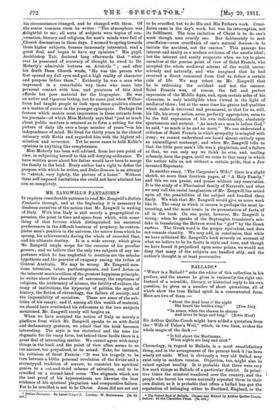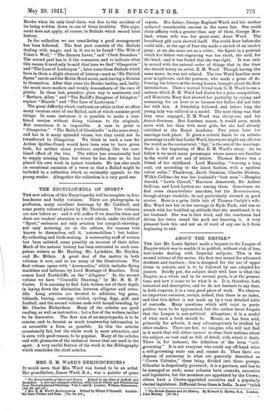BALLADS.* "WHAT is a Ballad? " asks the editor of
this collection in his preface, and the answer he gives is eminently the right one. Instead of a scientific, literary, or historical reply to his own question, he gives us a number of short quotations, all of which show the true Ballad spirit in a concentrated form. Here are two of them :-
"About the dead hour o' the night
She heard the bridles ring." (Tam Lin) "In somer, when the shawes be sheyno And leves be large and long." (Robin Hood) Sir Arthur Quiller-Couch might have added a quotation from the " Wife of Usher's Well," which, in two lines, evokes the whole magic of the dark :-
" It fell about the Martinmas, When nights are lang and mirk."
Chronology, in regard to Ballads, is a most unsatisfactory thing, and in the arrangement of the present book it i•as been wisely set aside. What is obviously a very old Balla.d may exist only in modern version. Objection, too, might also be raised against locality. It is probable that there were very few such things as Ballads of a particular district. In primi- tive times the minstrel wandered over the country, and the people who learnt his verses naturally repeated them in their own dialect, so it is probable that often a ballad has got the reputation of belonging either to Scotland, England, or the
• The Oxford Book of Ballads. Chosen and Edited by Arthur Quiller-Conch. Orford: At the Clarendon Press. [Be. net.]
Border when its only local claim was due to the accident of its being written' down in one of these localities. This argu- ment does not apply, of course, to Ballads which record local history.
In the collection we are considering a good arrangement has been followed. The first part consists of the Ballads dealing with magic, and in it are to be found "The Wife of Usher's Well," " The Dmmon Lover," and " Clerk Saunders." The second part has in it the romances, and to indicate what this means it need only be said that here we find " Glasgerion " and "The Lass of Lochroyan " ; later come those Ballads which have in them a slight element of history—such as "Sir Patrick Spans" carols and the Robin Hood series, each having a division to themselves. After that come the Border battles, and, lastly, the much more modern and weakly descendants of the race of giants. In these last, grandeur gives way to sentiment, and Barbara Allen " and " The Bailiff's Daughter of Islington" replace " Binorie " and " The Lass of Lochroyan.'
The great difficulty which confronts an editor is that so often many versions exist of one Ballad, each of which contains good things. In some instances it is possible to make a com- bined version without doing violence to the originals. But sometimes it is impossible. A case in point is " Glasgerion." " The Ballad of Glenkindie " is the same story, and has in it many splendid verses, but they could not be transferred to .Glasgerion. We think in such a case Sir Arthur Quiller-Couch would have been wise to have given both, for neither alone produces anything like the com- bined effect of the two. The editor has occasionally had to supply missing lines, but where he has done so he has placed his own work in square brackets. He has also made an occasional omission of a verse so that a Ballad might be included in a collection which so eminently appeals to the young reader. Altogether the collection is a very good one.









































 Previous page
Previous page